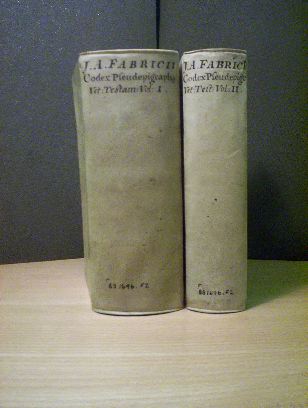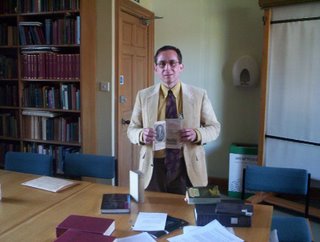(For those new to this site, the Old Testament pseudepigrapha are ancient books that claim [fictionally] to be written by characters in the Old Testament/Hebrew Bible or to be set in OT/HB times, but which do not belong to the Jewish, Catholic, Protestant, or [with an exception or two] Orthodox biblical canons. For more discussion and some related definitions see here, here, and here.)
Anyhow, as I was getting ready for a seminar presentation on the More Old Testament Pseudepigrapha Project which Alex Panayotov and I gave last Wednesday, on a whim I checked the St. Andrews University Library catalogue and I found that it has a copy of Fabricius's Codex pseudepigraphus. Our library used to be a copyright library and it seems to have nearly everything that was published in the early modern period, but this copy, as you will see, seems to have come to it only recently. (I have commented on other treasures in it here and here.) So I went down to the Archives and requested the book. Here are some photographs. You can click on each one to get a larger image.
 These are the two volumes of Fabricius's Codex pseudepigraphus Veteris Testamenti.
These are the two volumes of Fabricius's Codex pseudepigraphus Veteris Testamenti. Here are the frontispiece and title page of volume one. (The beaded necklaces are called "snakes" and are used by librarians to hold open a fragile book. These volumes were tightly bound and somewhat brittle, so we had to be very careful not to open them too wide, lest we crack the binding.)
Here are the frontispiece and title page of volume one. (The beaded necklaces are called "snakes" and are used by librarians to hold open a fragile book. These volumes were tightly bound and somewhat brittle, so we had to be very careful not to open them too wide, lest we crack the binding.) Here is the title page of volume 2.
Here is the title page of volume 2. Apparently this set was owned by someone named Henry Labarge (?) about whom I know nothing. It passed into the hands of St. Andrews Semitist A. M. Honeyman, who donated it to the University Library in 1985.
Apparently this set was owned by someone named Henry Labarge (?) about whom I know nothing. It passed into the hands of St. Andrews Semitist A. M. Honeyman, who donated it to the University Library in 1985. Fabricius included many of the works found now in the two Pseudepigrapha volumes edited by Charlesworth, although not all of the Charlesworth texts were know in Fabricius's time. Here is the entry for the Testaments of the Twelve Patriarchs.
Fabricius included many of the works found now in the two Pseudepigrapha volumes edited by Charlesworth, although not all of the Charlesworth texts were know in Fabricius's time. Here is the entry for the Testaments of the Twelve Patriarchs.  Fabricius also included some texts that are not in the Charlesworth volumes but which are now included in the More Old Testament Pseudepigrapha Project. For example, the Story of Melchizedek is a Greek rewritten scripture about Melchizedek. Sometimes it is attributed pseudonymously to Athanasius but mostly it is transmitted without an author.
Fabricius also included some texts that are not in the Charlesworth volumes but which are now included in the More Old Testament Pseudepigrapha Project. For example, the Story of Melchizedek is a Greek rewritten scripture about Melchizedek. Sometimes it is attributed pseudonymously to Athanasius but mostly it is transmitted without an author. Likewise, the Melchizedek Story in the Chronicon Paschale is part of the MOTP corpus.
Likewise, the Melchizedek Story in the Chronicon Paschale is part of the MOTP corpus. I brought both volumes to the seminar on Wednesday. You can see other pseudepigrapha collections (Charles, Charlesworth, James) and related works (including M. R. James's ghost stories and my own book) scattered about on the table.
I brought both volumes to the seminar on Wednesday. You can see other pseudepigrapha collections (Charles, Charlesworth, James) and related works (including M. R. James's ghost stories and my own book) scattered about on the table.I am grateful to the Special Collections Department of the Main Library of the University of St. Andrews for making these volumes available to me, our students, and the readers of PaleoJudaica.
[PHOTO ESSAY -- bumped to the top of the page for 15 May. Lots more posts below.]
No comments:
Post a Comment